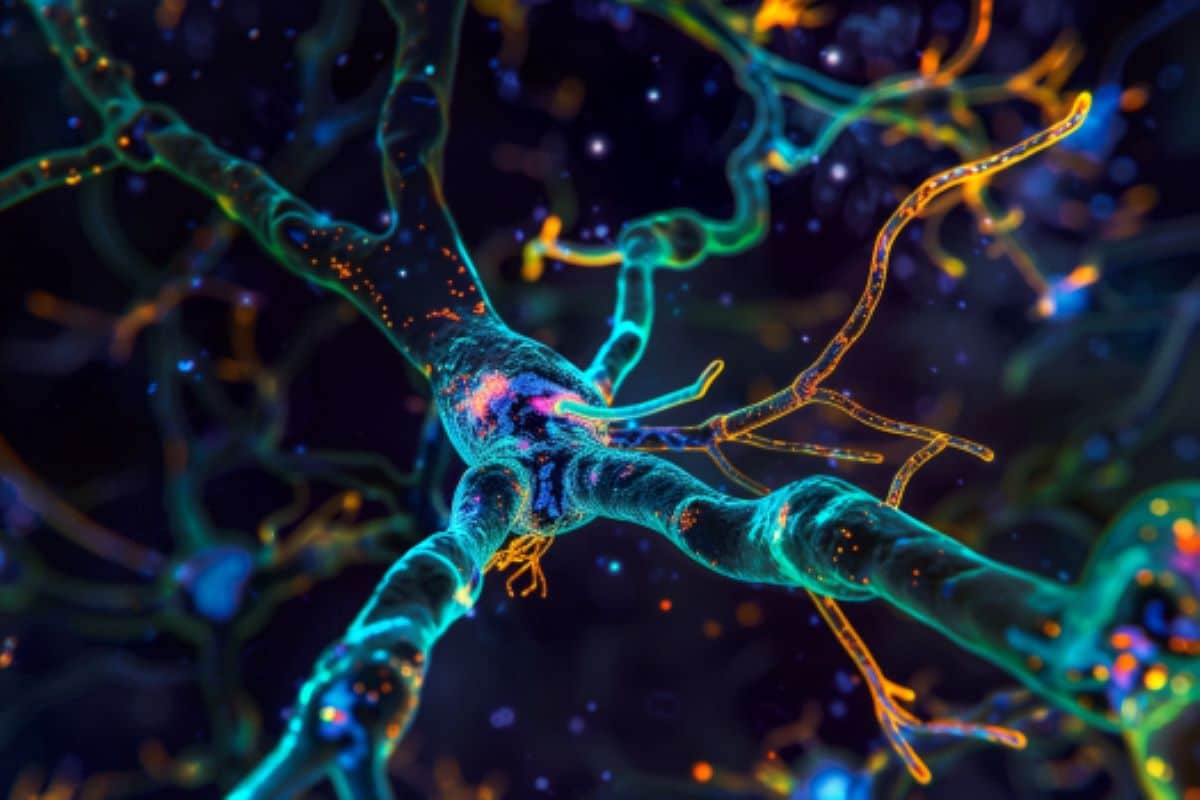Summary: Researchers discovered a new role for opioid receptors in the development of the enteric nervous system (ENS), the “brain in the gut.” This finding challenges the conventional understanding of opioid receptors, highlighting their significance beyond pain management and addiction.
The study used zebrafish embryos to reveal that opioid receptors are crucial for the formation of gut nerves, potentially impacting treatments for congenital digestive disorders.
Key Facts:
- Opioid receptors are essential for the development of the enteric nervous system.
- Disruption of these receptors affects the migration and maturation of gut neurons.
- Findings may lead to new treatments for congenital digestive disorders.
Source: Rice University
Researchers at Rice University have revealed a previously unknown function of opioid receptors in the development of the enteric nervous system (ENS), often referred to as the “brain in the gut.”
This discovery challenges conventional understanding of opioid receptors, shedding new light on their significance beyond pain management and addiction.
Led by Rosa Uribe, an assistant professor of biosciences at Rice and a Cancer Prevention and Research Institute of Texas (CPRIT) Scholar, the research team identified the genes critical for ENS development by conducting a series of experiments using zebrafish embryos, which share many genetic similarities with humans.

The ENS is a network of neurons in the gastrointestinal tract that plays a vital role in regulating digestive processes.
The team’s research was published in the PLOS ONE journal on May 29.
“We found that the opioid signaling pathway is required for the developmental formation of nerves in the gut, an understudied part of the body called the enteric nervous system,” Uribe said.
Using gene-editing techniques, the researchers selectively removed, or knocked out, a single gene from an entire population of zebrafish embryos to observe how these genetic alterations affected the formation of gut nerves. This process revealed novel genes, including those encoding opioid receptors, implicated in ENS development.
Contrary to previous assumptions, the researchers found that opioid receptors are not solely involved in pain perception and addiction but are also integral to the developmental formation of gut nerves.
“When these receptors were deactivated, the migration and maturation of enteric neurons along the gut were disrupted,” Uribe said. That disruption indicates the crucial role of opioid signaling pathways in ENS development.
The team’s findings open up new avenues for understanding digestive health and disease. Many infants born with missing gut nerves experience difficulties in passing stool, highlighting the potential impact of this research on pediatric medicine. Understanding the role of opioids in gut development may pave the way for innovative treatments for congenital digestive disorders.
“Our research unveils a new aspect of opioid receptor function and highlights their unexpected role in gut development,” Uribe said. “This could have profound implications for understanding digestive disorders and potentially lead to new therapeutic approaches.”
Moreover, the study identified other genes, such as VGF, with implications for gastrointestinal health. Further research in this area could uncover more insights into the complex interplay between genes, the nervous system and digestive function, said lead researcher and postdoctoral fellow Rodrigo Moreno Campos.
“Our finding is incredible and opens up a whole new avenue of enteric neurodevelopmental biology research in the field,” Moreno Campos said. “The implications for congenital, neurological and metabolic disease are great.”
Uribe joined Rice in 2017 as a CPRIT Scholar. She earned a bachelor’s degree in cell and molecular biology from San Francisco State University in 2006 and a doctorate in molecular cell and developmental biology from the University of Texas at Austin in 2012. In 2020, she won an NSF CAREER Award.
Funding: This study was supported by the National Institutes of Health grant R01DK124804 awarded to R.A.U., and by National Science Foundation grant 1942019 awarded to R.A.U. The funders had no role in study design, data collection and analysis, decision to publish, or preparation of the manuscript.
About this neuroscience research news
Author: Marcy de Luna
Source: Rice University
Contact: Marcy de Luna – Rice University
Image: The image is credited to Neuroscience News
Original Research: Open access.
“A targeted CRISPR-Cas9 mediated F0 screen identifies genes involved in establishment of the enteric nervous system” by Rosa Uribe et al. PLOS ONE
Abstract
A targeted CRISPR-Cas9 mediated F0 screen identifies genes involved in establishment of the enteric nervous system
The vertebrate enteric nervous system (ENS) is a crucial network of enteric neurons and glia resident within the entire gastrointestinal tract (GI). Overseeing essential GI functions such as gut motility and water balance, the ENS serves as a pivotal bidirectional link in the gut-brain axis. During early development, the ENS is primarily derived from enteric neural crest cells (ENCCs).
Disruptions to ENCC development, as seen in conditions like Hirschsprung disease (HSCR), lead to the absence of ENS in the GI, particularly in the colon. In this study, using zebrafish, we devised an in vivo F0 CRISPR-based screen employing a robust, rapid pipeline integrating single-cell RNA sequencing, CRISPR reverse genetics, and high-content imaging.
Our findings unveil various genes, including those encoding opioid receptors, as possible regulators of ENS establishment. In addition, we present evidence that suggests opioid receptor involvement in the neurochemical coding of the larval ENS.
In summary, our work presents a novel, efficient CRISPR screen targeting ENS development, facilitating the discovery of previously unknown genes, and increasing knowledge of nervous system construction.







